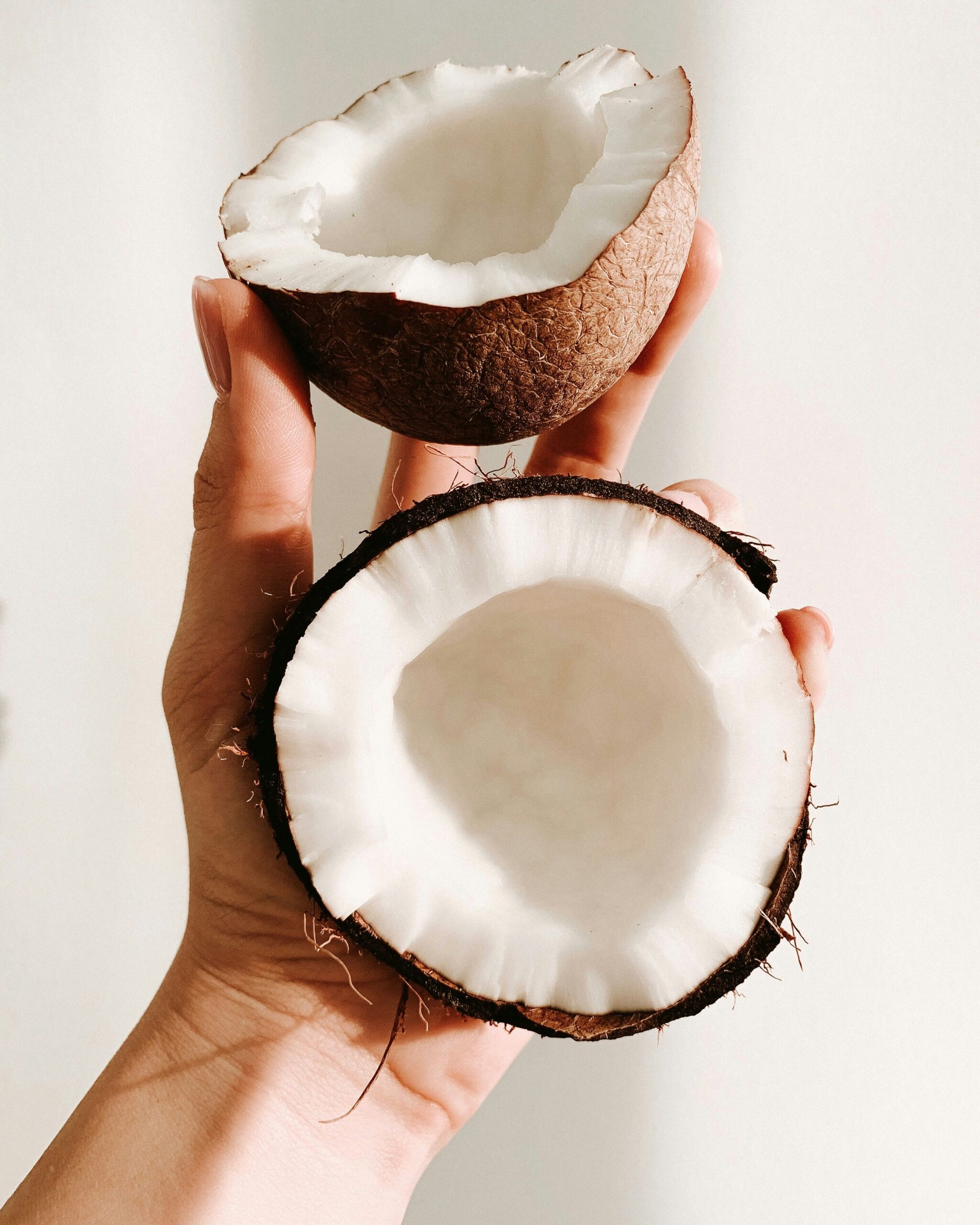Coconut oil has become a staple in many households, not just in the kitchen but also in the realm of skincare. This natural oil, derived from the meat of mature coconuts, has been used for centuries in tropical regions for its numerous health benefits.
In recent years, its popularity has surged in the beauty industry due to its versatile applications and perceived benefits for the skin. This article will explore the various aspects of using coconut oil in skincare, including its benefits, potential drawbacks, applications, and scientific backing.
The Composition of Coconut Oil
Coconut oil is primarily composed of saturated fats, making up about 90% of its content. These saturated fats include lauric acid, capric acid, caprylic acid, and palmitic acid. Among these, lauric acid is the most prominent, constituting around 50% of the oil. Lauric acid is known for its antimicrobial properties, which play a significant role in skincare.
In addition to these fatty acids, coconut oil contains vitamins E and K, which contribute to its nourishing and antioxidant properties. Vitamin E is particularly beneficial for skin health, as it helps protect the skin from damage caused by free radicals and supports the skin’s barrier function.
Benefits of Coconut Oil for Skin
Moisturization
Coconut oil is an excellent moisturizer for the skin. Its fatty acids penetrate the skin easily, providing deep hydration without leaving a greasy residue. Unlike water-based moisturizers, coconut oil creates a barrier on the skin that helps retain moisture, making it particularly useful for individuals with dry or flaky skin.
Antimicrobial Properties
The lauric acid in coconut oil has potent antimicrobial effects. It can help fight off bacteria, fungi, and viruses, making it a good option for preventing infections and treating minor cuts or wounds. Additionally, its antimicrobial properties can benefit individuals with acne-prone skin by reducing the bacteria that cause acne.
Anti-inflammatory Effects
Coconut oil has anti-inflammatory properties that can help soothe irritated skin. This makes it an effective treatment for conditions like eczema, psoriasis, and dermatitis. Its ability to reduce inflammation can also aid in minimizing redness and swelling associated with these conditions.
Antioxidant Benefits
The presence of vitamin E in coconut oil provides antioxidant benefits that protect the skin from oxidative stress caused by free radicals. This can slow down the aging process, reducing the appearance of fine lines, wrinkles, and age spots. Regular use of coconut oil can promote a youthful and radiant complexion.
Healing Properties
Coconut oil can accelerate the healing process of the skin. Its moisturizing, antimicrobial, and anti-inflammatory properties work together to support skin repair and regeneration. This makes it a good option for treating minor burns, cuts, and other skin injuries.
How to Use Coconut Oil in Skincare
As a Moisturizer
Coconut oil can be used as a standalone moisturizer or mixed with other ingredients like essential oils or aloe vera gel for added benefits. To use it as a moisturizer, simply take a small amount of the oil, warm it between your palms, and apply it to the skin in gentle, circular motions. It’s especially beneficial to apply coconut oil after a shower when the skin is still slightly damp to lock in moisture.
As a Makeup Remover
Coconut oil is an effective and natural makeup remover. It can dissolve even waterproof makeup without stripping the skin of its natural oils. To use it as a makeup remover, apply a small amount of coconut oil to a cotton pad or your fingertips and gently massage it onto your face. After the makeup is dissolved, rinse your face with warm water or wipe it off with a damp cloth.
As a Lip Balm
Due to its hydrating and healing properties, coconut oil is an excellent natural lip balm. It can help soothe chapped lips, providing long-lasting moisture. You can apply a small amount of coconut oil to your lips throughout the day or before bedtime to keep them soft and supple.
As a Body Scrub
Coconut oil can be combined with sugar or salt to create an exfoliating body scrub. This DIY scrub helps remove dead skin cells, leaving the skin smooth and rejuvenated. To make a simple body scrub, mix equal parts of coconut oil and sugar (or salt), and gently massage it onto your skin in circular motions before rinsing off in the shower.
As a Hair Treatment
While this article focuses on skincare, it’s worth noting that coconut oil can also benefit your hair. It can be used as a deep conditioning treatment to nourish and repair dry or damaged hair. Simply apply the oil to your hair, leave it on for at least 30 minutes (or overnight), and then wash it out with shampoo.
Scientific Evidence and Research
While anecdotal evidence and traditional uses of coconut oil are abundant, scientific research has also explored its benefits for skin health.
Moisturization and Skin Barrier Function
A study published in the Journal of International Dermatology found that virgin coconut oil can improve skin hydration and increase skin surface lipid levels. The study concluded that coconut oil is as effective as mineral oil, a commonly used moisturizer, in improving skin hydration and protecting the skin barrier.
Antimicrobial and Anti-inflammatory Properties
Research has shown that lauric acid, the primary fatty acid in coconut oil, has significant antimicrobial properties. A study published in Antimicrobial Agents and Chemotherapy demonstrated that lauric acid could effectively inhibit the growth of Propionibacterium acnes, the bacteria responsible for acne. Additionally, another study highlighted the anti-inflammatory effects of coconut oil, which could be beneficial in treating inflammatory skin conditions.
Wound Healing
A study conducted on rats and published in Skin Pharmacology and Physiology found that virgin coconut oil can accelerate the healing process of wounds. The study noted that coconut oil enhanced collagen production, an essential component of skin healing, and had an antioxidant effect that helped protect the skin from damage during the healing process.
Potential Drawbacks of Coconut Oil in Skincare
While coconut oil has many benefits, it’s essential to be aware of its potential drawbacks, especially for certain skin types.
Comedogenicity
Coconut oil is considered comedogenic, which means it can clog pores. This makes it unsuitable for individuals with oily or acne-prone skin, as it may lead to breakouts. If you have this skin type and still want to use coconut oil, it’s advisable to do a patch test first or consider using it only in non-acne-prone areas, such as the body.
Allergic Reactions
Although rare, some individuals may be allergic to coconut oil. It’s important to perform a patch test before using coconut oil extensively on the skin. Apply a small amount to a discreet area and wait 24 hours to see if any irritation or allergic reaction occurs.
Purity and Quality Concerns
Not all coconut oils are created equal. It’s crucial to choose high-quality, virgin, or cold-pressed coconut oil for skincare purposes. Refined or hydrogenated coconut oils may contain additives or have undergone processes that reduce their beneficial properties. Always check the label and opt for pure, organic coconut oil whenever possible.
Coconut Oil in Skincare Products
Given its popularity, coconut oil is a common ingredient in many skincare products. It can be found in lotions, creams, lip balms, cleansers, and even sunscreens. When purchasing skincare products containing coconut oil, it’s essential to consider the overall formulation. Some products may contain additional ingredients that could counteract the benefits of coconut oil or cause irritation.
Choosing the Right Products
When selecting coconut oil-based skincare products, look for those with minimal ingredients and without harsh chemicals or fragrances. The simpler the formulation, the less likely it is to cause irritation or diminish the effectiveness of coconut oil. Additionally, consider the product’s packaging—opt for products in opaque or dark containers to protect the oil from light exposure, which can degrade its quality.
DIY Coconut Oil Skincare Recipes
For those who prefer a more natural approach to skincare, making your own coconut oil-based products is a great option. Here are a few simple DIY recipes:
- Coconut Oil and Honey Face Mask: Combine one tablespoon of coconut oil with one tablespoon of honey. Apply the mixture to your face, leave it on for 15-20 minutes, then rinse off with warm water. This mask is hydrating and soothing, making it ideal for dry or sensitive skin.
- Coconut Oil Deodorant: Mix 1/4 cup of coconut oil with 1/4 cup of baking soda and a few drops of essential oil (such as lavender or tea tree oil). This natural deodorant helps neutralize odor while keeping your skin moisturized.
- Coconut Oil Cuticle Cream: Simply rub a small amount of coconut oil onto your cuticles to keep them soft and prevent hangnails. You can also add a few drops of vitamin E oil for added nourishment.
Sustainable and Ethical Considerations
As with any natural product, the sustainability and ethical sourcing of coconut oil are important considerations. The increasing demand for coconut oil has raised concerns about the environmental impact of its production and the working conditions of those involved in the industry.
Sustainable Farming Practices
Coconut farming can have a significant environmental impact, particularly when it involves large-scale monoculture plantations. These can lead to deforestation, loss of biodiversity, and soil degradation. To minimize these impacts, it’s essential to support brands that source their coconut oil from farms that practice sustainable agriculture. This includes methods like organic farming, agroforestry, and fair trade practices.
Fair Trade and Ethical Sourcing
When purchasing coconut oil or coconut oil-based products, look for certifications like Fair Trade or similar labels that indicate the product was sourced ethically. Fair Trade ensures that the farmers and workers involved in the production process receive fair wages and work under safe conditions. Supporting ethically sourced coconut oil helps promote better livelihoods for communities in coconut-growing regions and encourages sustainable practices.
Conclusion
Coconut oil is a versatile and natural ingredient that can offer numerous benefits for the skin. From providing deep moisturization and fighting bacteria to soothing inflammation and promoting healing, its properties make it a valuable addition to any skincare routine. However, it’s essential to use coconut oil mindfully, considering factors like skin type, quality of the oil, and potential drawbacks.
While scientific research supports many of the benefits of coconut oil, it’s always important to pay attention to how your skin responds and adjust your usage accordingly. Whether you choose to use coconut oil directly or as part of a formulated product, it can be a powerful ally in achieving healthy, glowing skin. By also considering sustainability and ethical sourcing, you can enjoy the benefits of coconut oil while making a positive impact on the environment and communities involved in its production.




